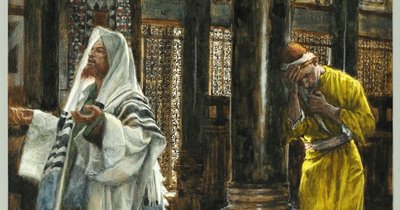Thoughts for the Day
Sunday, 26th October 2025: The Parable of the Pharisee and the Tax-collector
Luke 18 Humility Tax-collector Pharisee Parable Sin Forgiveness
Reading : Verses from Luke, Chapter 18

* Painting by Tissot (19th century)
Jesus also told this parable to some who trusted in themselves that they were righteous and regarded others with contempt: ‘Two men went up to the temple to pray, one a Pharisee and the other a tax-collector. The Pharisee, standing by himself, was praying thus, “God, I thank you that I am not like other people: thieves, rogues, adulterers, or even like this tax-collector. I fast twice a week; I give a tenth of all my income.” But the tax-collector, standing far off, would not even look up to heaven, but was beating his breast and saying, “God, be merciful to me, a sinner!” I tell you, this man went down to his home justified rather than the other; for all who exalt themselves will be humbled, but all who humble themselves will be exalted.’
(Lectionary, New Revised Standard Version)
Thoughts
Oh dear! Jesus has the habit of getting inside our heads with some of his parables, and the story of the Pharisee and the Tax-collector in Luke's Gospel, only in his Gospel, is one such. The trouble is we have grown used to the Pharisees being treated as the bad guys. Jesus has accused them of a number of things - of seeking the best seats in the synagogue, of wearing over-the-top lavish clothes, of demanding tight rules for the people that they did not obey themselves, and of being like whited sepulchres (all show on the outside but decayed inside) - but the fact is that they were the reform party, that is those who sought to obey the Law of Moses. Amongst them would have been many good men, like Nicodemus who came to Jesus at night (John 3.1-7) and who brought oils to anoint Jesus body after his death (John 19.39-40).
In the parable we have a Pharisee who has actually been trying to live according to the Law. We are told he prays, he fasts twice a week, and gives one tenth of his income to God (possibly to the Temple). So he is seemingly a good man! Yet we are told that at the end of the day he is not put right with God (ie justified). Whereas the tax-collector who works for the enemy, the Romans, and who likely ran all kinds of scams, was justified in God's sight.
After a few days of looking at the fruits of the Spirit, we are taught here a salutary lesson. We cannot put ourselves right with God just through our actions. The Pharisee had fallen into the sin of spiritual pride and arrogance. He thought he could earn God's freedom, but we are totally dependant on the free mercy of a loving God when we confess our total short-comings. Appearances are deceptive, and that moment when we looked at another and dismissed them as worthless, requires nothing less than we learn humility before our Heavenly Father and confess our sin.
Prayer
Lord God,
even as we worship You
or do Your good works
our thoughts can let us down.
We confess the sins of arrogance
and pride this day,
and humbly ask Your forgiveness.
Help us to be honest with ourselves
and with You in future,
and learn to trust in Your loving mercy.
Amen.
You might like to look at this subject in the Bible:
Or play this old worship song:
- Grace greater than our sin (Joslin Grove Choral Society)